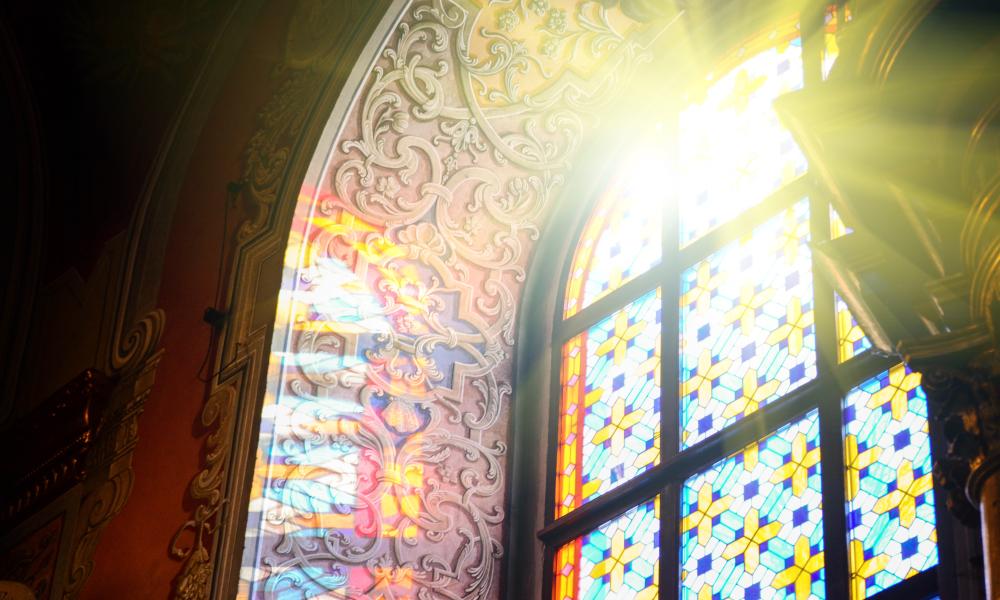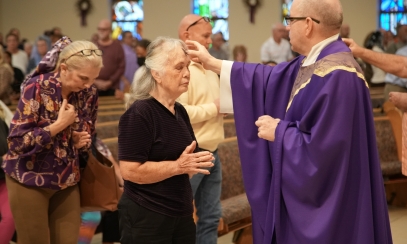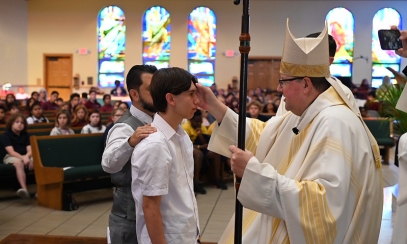
Churches in Need of Divine Renovation
Father Don Amodeo was one of our Diocesan priests who attended the annual Convocation for Priestly Renewal October 3-6, 2022. He wrote a reflection on his experience at the Convocation, focusing on presentations by Father James Mallon, author of the best-selling book, Divine Renovation, that looks at parish renewal and the new evangelization.
Father Don Amodeo was one of our Diocesan priests who attended the annual Convocation for Priestly Renewal October 3-6, 2022. He wrote a reflection on his experience at the Convocation, focusing on presentations by Father James Mallon, author of the best-selling book, Divine Renovation, that looks at parish renewal and the new evangelization.
October 11, 2022 | Over several days this last week, I was together with most of the priests of our Diocese, attending our convocation which is part retreat, part conference, and partly a time to get away and reconnect with your brother priests, many of whom you may not get to see throughout most of the year.
Father James Mallon was our speaker for the conference, and his talks centered on revitalization, though in the process of spelling out the need for that revitalization, there was predictably a lot of doom and gloom in the statistics he shared. While our Diocese is better off than most, and indeed our parish here at Nativity is healthier than most parishes, the overall picture for the Church in the western world is looking pretty grim.
If you follow Catholic blogs or Church news at all, you’re likely already familiar with the figures, but it can sometimes be a good reminder to hear from someone like Father James, whose own diocese up in Canada has had to go through aggressive restructuring, selling many churches as multiple parishes get consolidated into one or just outright close their doors.
“Think of me like a time traveler,” he told us early on. “I’ve traveled here from twenty years in the future to warn you about what’s coming. In my time, we aren’t worried about a lack of priests anymore. What we face is a lack of parishioners.”
Our convocation took place at the Bethany Center—a beautiful place with cozy cabins and two serene lakes on the property—and so there can be an almost surreal disconnect between the natural blessings surrounding us (especially with weather as ideal as we experienced last week), and these gloomy forecasts for the future of the Church.
Figures such as the proportion of Catholics leaving the faith versus those coming in are sobering, and yet, even in today’s Gospel—even when Jesus Himself is healing ten lepers—only one returns to give thanks. Only one in ten becomes a disciple.
Should Jesus have adopted a better Faith Formation program? Could the Lord use some advice on how to increase his disciple retention rate?
Now, I don’t mean to frame the present crisis as one of those “problems that we’ve always had with us” as if there is nothing new to see here—as if there’s no one at fault and nothing to be done. No, the great falling away that we’re presently witnessing does mark a radical departure from the past (the recent past, at least), such that we do need to decisively respond.
But before we can draw a multitude of souls to give thanks to God—before we can persuade the nine lepers who left to come back to Jesus—we ourselves need to be like the one faithful leper who fell at our Lord’s feet and thanked him.
We have to ask: Are we grateful amid the dire forecasts? Do we thank God for the priceless treasure Christ has left us in the Church, or do we feel like employees of a company that quarter after quarter is falling short on its projected earnings?
The Church has human members, but she is not a purely human institution. Just as Christ achieved victory, not through winning over the world, but on the Cross, the Bride of Christ too may enter an age in which her own conquest comes through what the world views as death, decline, and defeat.
At the end of the day, God is in charge. If you’ve lived long enough, there’s a good chance you’ve had what many call a religious experience—a powerful moment in which you’ve felt God open your heart and your mind to see things in a way that you didn’t see them before. God can enkindle our hearts like that, be He can also harden our hearts.
Our free will remains, but the light of inspiration which the Holy Spirit brings—sometimes God withdraws that as he did when hardening the heart of Pharaoh at the time of Moses. The Lord is not morally obliged to make mankind see what we do not want to see.
We can speculate as to why, argue about who is to blame, yet ultimately, every conversion is the work of the Holy Spirit. You and I may have a part to play, but it is God who truly transforms people’s lives.
What this means is that, while everyone here is indeed called to go out and evangelize—to talk to people about the faith, invite them, sometimes to challenge them—while we are all called to do those things, God is not bound by our efforts. The Holy Spirit does not depend upon you and me, and that’s a good thing.
“Such is the gospel, for which I am suffering, even to the point of chains,” says St Paul in our second reading, adding: “But the Word of God is not chained.”
Even when St Paul is locked up, physically unable to evangelize beyond writing a few letters to the faithful—even still, the Spirit is at work.
So, while we ought not to be ignorant of the sobering statistics, those numbers should serve not to discourage us, but to motivate us. Even when it feels like we can do very little to impact the culture, to influence the world around us, God nonetheless can achieve great things with the little that we are able to do.
There may stand on our horizon the shadow of the Cross, but there also stands the Resurrection.
Father Don Amodeo is parochial vicar at Nativity Catholic Church in Brandon. This reflection was the homily for Mass he celebrated on October 9, 2022.



